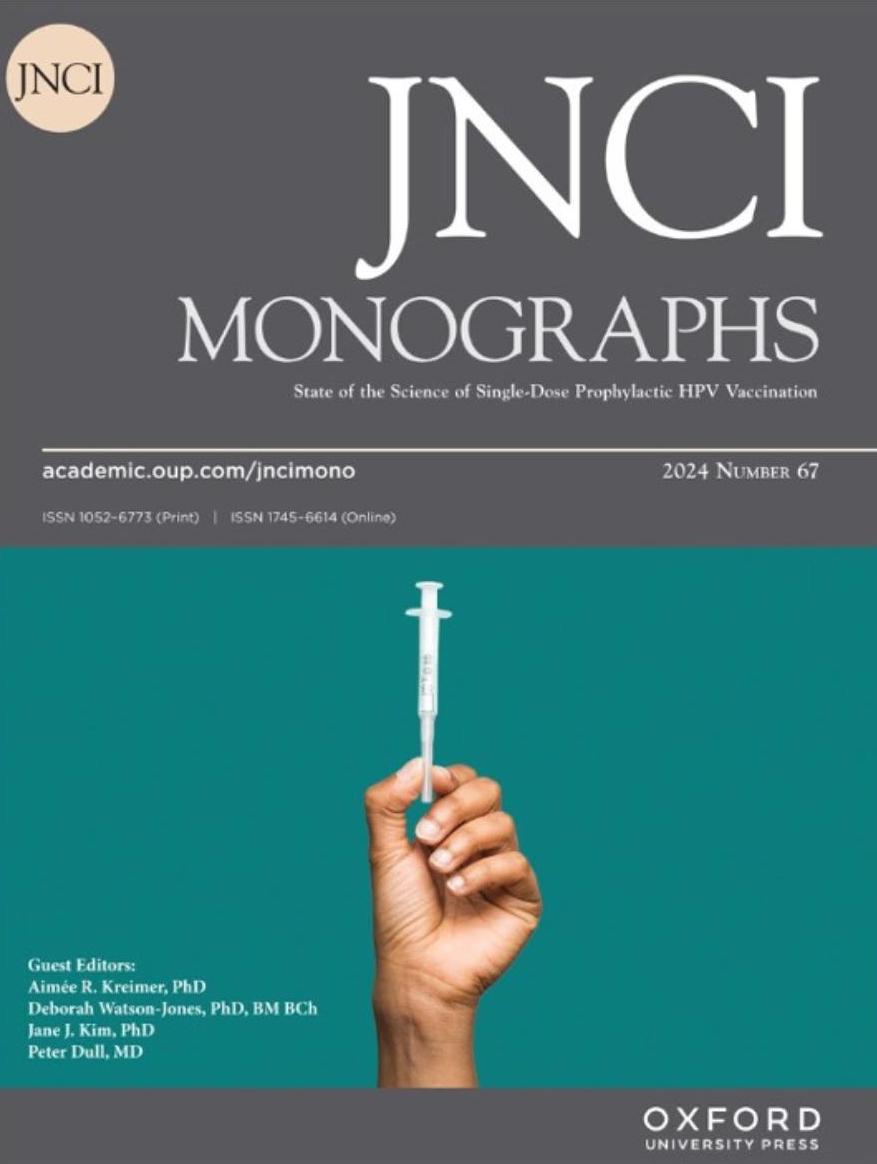HPV Single-Dose Protection: JNCI Monograph Summarizes the Evidence
, by Jennifer K. Loukissas, M.P.P.
The vaccine against human papillomavirus (HPV) infection, the necessary cause of nearly all cervical cancers and malignancies at five other anatomic sites, was first administered in a three-dose regimen. Since its licensure in 2006, evidence has supported a shift from a three-dose to a single-dose regimen of the vaccine.
In 2011, investigators on the NCI Costa Rica HPV Vaccine Trial, led by Aimée R. Kreimer, Ph.D., senior investigator in the Infections and Immunoepidemiology Branch, reported that a single-dose regimen may provide robust protection against HPV infection, prompting the launch of multiple studies to confirm and characterize further this finding. Based on the strength of evidence from a compilation of data sources, the World Health Organization (WHO) endorsed the use of an alternative single-dose HPV vaccination schedule in 2022.
On November 12, 2024, Dr. Kreimer and her fellow guest editors from Harvard T.H. Chan School of Public Health, the Bill & Melinda Gates Foundation, and the London School of Hygiene and Tropical Health published Journal of the National Cancer Institute Monograph entitled, “State of the Science of Single-Dose Prophylactic HPV Vaccination,” comprised of 13 studies which together update the state of the science on single-dose HPV vaccination since WHO’s recommendation. The papers add to and reinforce earlier findings: across multiple geographies, single-dose HPV vaccination yields strong protection against cervical HPV infection and disease, while also providing opportunities to reduce ongoing program costs and expand coverage. Below are highlights from these manuscripts.
Durability of Response
Longer follow-up from the studies that provided the initial evidence base for single-dose protection show durability of response.
- From the IARC study, new follow-up data from 12 years post-vaccination demonstrate protective efficacy of single-dose HPV vaccination against infection along with first evidence of comparable impact among dosing regimens on cervical pre-cancers. (Paper: “A prospective cohort study comparing efficacy of one dose of quadrivalent HPV vaccine to two and three doses at an average follow up of 12 years post-vaccination”)
- From the CVT study, new follow-up data from 16 years post-vaccination demonstrate antibody levels remained stably robust after a single dose of HPV vaccine. Response trends indicate women should have protection for at least 20 years, and likely much longer at the observed rate of decline. (Paper: “HPV16/18 Antibodies 16-years after single dose of bivalent HPV vaccination: Costa Rica Vaccine Trial”)
Single-dose impact on adolescent girls with HIV
Results from prospectively designed population-based studies and new data on single-dose impact on adolescent girls with HIV add to the evidence base.
- A cross-sectional survey from South Africa found population-level effectiveness of single-dose HPV vaccination, irrespective of HIV status. (Paper: “Impact of single dose HPV vaccination on HPV16/18 prevalence in South African adolescent girls with and without HIV”)
- In a study in girls in Thailand, aged 13 - 14, single-dose HPV vaccination of HPV provided comparable impact on infection to a two-dose regimen at four years post-vaccination (Paper: “Community Intervention of Single-Dose or Two-dose Regimen of Bivalent HPV Vaccine in Schoolgirls in Thailand - Vaccine Effectiveness Two Years and Four Years Post-Vaccination”)
Public Health Impact
Mathematical models addressed economic impact and hypothetical future scenarios of waning single-dose vaccine efficacy to advise on program strategy. Across scenarios, evidence suggests immediate implementation of a single-dose schedule will have significant public health impact.
- Adopting single-dose HPV vaccination with resource reallocation is a resource-efficient approach to enhance progress towards cervical cancer elimination. (Paper: “Leveraging single-dose human papillomavirus vaccination dose-efficiency to attain cervical cancer elimination in resource-constrained settings”)
- A new model looking at six countries shows that a single-dose HPV vaccination schedule provides cost savings to immunization programs and enhances program affordability and sustainability. (Paper: “Evaluating potential program cost savings with a single-dose HPV vaccination schedule: a modeling study”)
- Models integrating new clinical data generated updated hypothetical scenarios of waning single-dose protection, projecting that countries taking immediate advantage of efficiencies afforded by a single-dose schedule could achieve the same level of health benefits by giving a second dose in a multi-age catch-up campaign in 2036, if waning occurs. (Paper: “Population-level health impact of hypothetical waning 1-dose human papillomavirus vaccination and 2-dose mitigation strategies in a high cervical cancer burden setting”)
- Based on new data on efficacy and duration of protection, population-level effectiveness of single-dose HPV vaccination in high-income countries is estimated to persist even under the most pessimistic efficacy and duration scenarios. (Paper: “Population-level impact of switching to one-dose HPV vaccination in high-income countries: Examining uncertainties using mathematical modeling”)
- Reallocating doses saved from implementing a single-dose schedule to vaccinate older girls and women is a resource-efficient approach to accelerate progress against cervical cancer. (Paper: “Leveraging single-dose human papillomavirus vaccination dose-efficiency to attain cervical cancer elimination in resource-constrained settings”)
Single-Dose Paves Way for the Future
WHO’s single-dose recommendation and the strong national uptake of a single-dose schedule holds implications for vaccine development approaches and has yielded new implementation insights.
- The majority of health providers surveyed in Kenya found single-dose HPV vaccination for adolescent girls and young women acceptable because it reduced the burden on providers and patients. (Paper: “Acceptability of Single-dose HPV Vaccination Schedule Among Healthcare Providers in Kenya: A Mixed-Methods Study”)
- A time-limited “screen-triage-treat” strategy alongside high coverage of single-dose vaccination shows promise in a demonstration project in nine countries. (Paper: “A Cervical Cancer Control Strategy for Lower-Resource Settings: Interventions to Complement One-Dose HPV Vaccination”)
Reference
Kreimer AR et al. State of the Science of Single-Dose Prophylactic HPV Vaccination, JNCI Monographs. 2024.
